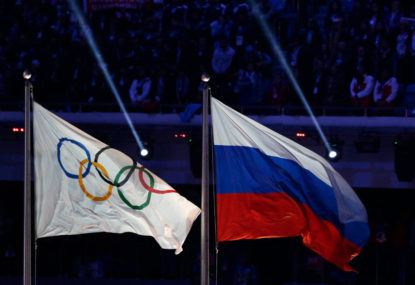‘This is the most disgraceful performance by a national squad in Australian sporting history.’
‘They went away expected to win 50 gold medals and won a miserable five.’
‘Showed no discipline. Treated the event as a big party, and had none of the courage, character, commitment or poise, perspiration, perseverance, guts, grunt and gratitude, associated with an Australian squad.’
‘Next time we’ll pick a squad that will show these qualities. This has been a national disgrace.’
‘Heads will roll,’ said Bobby ‘Bumper’ Bumpstead, head of the Australian Paralympic Committee.
Would you expect to read such outraged comments? No. Excoriating our most vulnerable? Disgusting.
If they’re supposed to be about anything, the Paralympics are about giving true meaning to the Olympic spirit of competing, not winning.
Gold medals are meaningless. Except they do have meaning.
This was brought home by the banning of the Russian Paralympic team.
There are the images of drug-crazed Russian wheelchair athletes hurtling around tracks. Beyond that, there’s the denial of competitors with disabilities being able to participate in what is supposed to be a celebration.
There is controversy over Australian swimmers with Down Syndrome, small in number, being denied entry to the Paralympics because of eligibility and classification disputes. If any group deserves to participate in the celebration, surely swimmers with Down Syndrome do.
Meanwhile, there’ll be sizeable numbers of near able-bodied competitors at the Paralympics, but we can’t have the Russians there scooping up gold medals and allowing to boast: “Our people with disabilities are better than your people with disabilities.”
There will never be a shortage of inhumanity and suffering in the world, but there will always be counterbalancing advances. Without them, the world would stop turning, figuratively speaking.
In less than a generation, support for those with disabilities has been an enormous advance. The disabled now participate in team games and sports that once denied them.
They receive coaching support and technological advances that provide equipment that was once unavailable.
Before he was a convicted murderer, Oscar Pistorius was an extraordinary athlete by any measure.
The development of supports that allowed him to run, symbolised the technological developments in artificial limbs and wheelchairs allowing applications for the wider community of the disabled.
That’s an argument for the Paralympics, but it can only be taken so far and begs the question: have the Paralympics now gone far enough?
The inspiration has been provided, but have the Games degenerated into a medals race where Russia is banned and there’s a bewildering array of classifications, big or small, with no objective measures or criticisms applicable?
A journalist recently said wheelchair racer Kurt Fearnley was the greatest sportsperson, able-bodied or not able-bodied, Australia had produced.
Fearnley has certainly prodigious amounts of strength and endurance, but a little discussion with those working in the field, as it were, might prove the absurdity and inappropriateness of that claim.
Still, the Paralympics can always be embraced with the warm inner glow of “what a good humanitarian am I?”
And there are extraordinary achievers who won’t be at the Paralympics if we’re talking success. A Sydney accountant named Dwayne Fernandez had both legs amputated below the knees in early adolescence because of a congenital illness.
In adulthood, he’s trained to climb tall buildings in mighty bounds. He’s done Sydney, Melbourne, Singapore and the Empire State Building stair climb. There should be a classification for that.
He would have won any Paralympics up-the-top-of-the-grandstand-stairs-and-back marathon. Gold for Australia.
No gold for the highly-regarded Graeme Innes as disabilities commissioner, his position abandoned by the Abbott government, in an act as mean-spirited as denying the Russians a place.
The money involved was a pittance compared with Paralympics expenditure.
Just some of that expenditure would produce golden results if diverted from elite programs and coaches and given to those working in the grassroots rehabilitation-field.
No medals, but plenty of enriched lives.





























































































